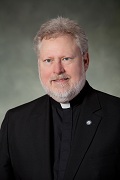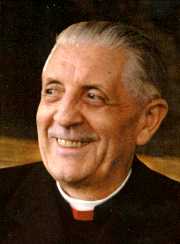In post yesterday (May 20) – “Must the Reformation Wars Continue?” – I ended by stating that there is a question I now routinely ask in my dialogue and mission with Catholics and Protestants. The question first came to me in a public setting that I’d like to explain.
 A decade or so ago I was recruited by an adult Sunday School class in a Nazarene Church to publicly interact with a Catholic theologian. A moderator by the name of Alan Krashesky (photo at left), the ABC television news anchor for Chicago, was chosen to lead this dialogue. At first I believe the adult class wanted us to have a debate but we both refused. I do not see debate formats as truly helpful except for winning points with those who already agree with your position. (Krashesky is a former-Catholic and yet he is profoundly trusted by the archdiocese for his fairness, a fairness that he has shown again and again in my presence.) I told the hosts that I would much rather have a conversation about the Christian faith that would allow us to respond to one another, discuss our very real differences, and then simply see what happened. They sought and found a partner for me in Fr. Thomas Baima. Fr. Baima is the Vice Rector for Academic Affairs at Mundelein Seminary, the archdiocesan seminary for Chicago. He is also a seasoned and skilled ecumenist who oversees the office of ecumenism for the archdiocese. He has served both the late Cardinal Bernardin and Cardinal George. Since that evening he has become a very dear friend to me.
A decade or so ago I was recruited by an adult Sunday School class in a Nazarene Church to publicly interact with a Catholic theologian. A moderator by the name of Alan Krashesky (photo at left), the ABC television news anchor for Chicago, was chosen to lead this dialogue. At first I believe the adult class wanted us to have a debate but we both refused. I do not see debate formats as truly helpful except for winning points with those who already agree with your position. (Krashesky is a former-Catholic and yet he is profoundly trusted by the archdiocese for his fairness, a fairness that he has shown again and again in my presence.) I told the hosts that I would much rather have a conversation about the Christian faith that would allow us to respond to one another, discuss our very real differences, and then simply see what happened. They sought and found a partner for me in Fr. Thomas Baima. Fr. Baima is the Vice Rector for Academic Affairs at Mundelein Seminary, the archdiocesan seminary for Chicago. He is also a seasoned and skilled ecumenist who oversees the office of ecumenism for the archdiocese. He has served both the late Cardinal Bernardin and Cardinal George. Since that evening he has become a very dear friend to me.
During this exciting evening discussion, one which was my first in this context, we were each responding alternately to nine questions that had been prepared in advance by the adult class. I think it was question four but I shall never forget it. The card said, “When is a person born again?” 
Let me state, in my own words, what the Catholic Church really teaches about faith and repentance and the necessity of a personal relationship with Jesus Christ. Merely participating in baptism, confirmation, the eucharist and the entire sacramental system, without personally encountering Jesus Christ in faith and repentance, by the power of the Holy Spirit, will not save anyone. This includes the clergy. It should go without saying that this is true for all Christian churches and traditions; e.g. Baptist, Bible, Charismatic, Lutheran, Methodist, Pentecostal, Presbyterian, Reformed, Episcopal, Orthodox or Catholic! The simple fact is clear – you can be reared in a (any) Christian tradition and not personally know the grace of God in Jesus Christ. Lèon Joseph Cardinal Suenens, a major contributor to Vatican II (especially to the Decree on Ecumenism), once wrote:
It is not the truth about Jesus but the truth of Jesus which was at the basis of conversion. Experiencing Christ comes of necessity before the definition of that experience. St. Thomas Aquinas, a theologian whom no one would suspect of anti-intellectualism teaches that the object of faith is not found in doctrinal propositions concerning God, but in God itself known and loved in personal relationship.
To be a true Christian means, further more, to have met Jesus personally, as Savior, and as Lord. I must accept Jesus totally, as a reality, the Lord and Master of my life as I live and experience it day by day. During what we call the Christian centuries, it was commonly accepted that a Christian was, in the first place, someone who “practiced” his religion . . . Faith was judged by a perceptible norm: namely, the practice of one’s religion (Italics are mine, A New Pentecost, New York: Seabury Press, 1975, 59). Please understand, dear Catholic and Protestant reader, the late Cardinal Suenens (1904-1996) was a cardinal of the Catholic Church. He was also a major theological voice at Vatican II. He was a Belgian prelate and a man powerfully filled with the Holy Spirit. In the same book Suenens quotes from a French bishop: “We held the Vatican II Council in the belief it was self-evident that Christians were essentially destined to be missionaries. But that presupposes that they are believers. In fact, this was true only of a few.” Please read that statement again very slowly. This is a cardinal of the Catholic Church, a major theologian of the Council, writing these words it in 1975, over twenty years after the Council.
We must help Christians to become continually aware of their faith and live it on a more personal level. Many must be helped to exchange a sociological Christianity for a full and active life of faith. Christianity, which we have inherited which has its foundation mainly in the family and education, must mature into a Christianity of choice, based on a personal decision and embraced with full consciousness. As Tertullian said, “Christians become so, they are not born” (Italics again are mind, A New Pentecost, 121).
At the time I asked Fr. Baima my question in our dialogue that Sunday evening I had no idea that this type of clear teaching existed within the Catholic Church. I assumed that I knew what the Catholic Church clearly taught. I further assumed that if this or that was believed then anything like what you read above was not possible. It was, at least to my mind, a clear contradiction. I really only knew what I read in a few statements that I did not understand and in what I saw in the practice of many, many Catholics that I had personally led to trust Christ as their Lord and Savior while I was a pastor. These Catholics, as many Catholics now know all too well, are professing Christ but they do not know him personally.
I suggest that a far better strategy than one which invokes the “anathemas” of the Council of Trent is to pursue a deeper understanding of what I’ve written above. Here we can truly begin. Here we do not start with where we differ, though we do differ. Here we can truly begin because this is where Christianity should always begin – with Christ at the center and deeply personal, saving faith through Christian experience the main issue for life and mission. This is what I mean by missional-ecumenism really. It is precisely here that we can learn from one another and still disagree. But when we start here we will do this as true friends and real Christians.
If you read carefully you will soon find that the new evangelization of the Catholic Church clearly recognizes that evangelizing Catholics who do not have personal, saving faith is a major priority. I am an open, prayerful supporter of this “new evangelization.” How can I not be if I want all people everywhere, especially inside the Christian church, to know the living Christ as Lord and Savior?
All of this raised another question, one I will address tomorrow in Part Seven:
“How Do We Evangelize Church Members, Both Catholic and Protestant?”
Related Posts
Comments
My Latest Book!

Use Promo code UNITY for 40% discount!








Adam Shields liked this on Facebook.
Maurice Hagar II liked this on Facebook.
Awesome.
Where I live……….. 🙂
Rick Landry liked this on Facebook.
Forrest Lee Horn liked this on Facebook.
Tim Terhune liked this on Facebook.
Thomas Nathan Smith liked this on Facebook.
Bryan Prosser liked this on Facebook.
Richard Roland liked this on Facebook.
Jordan Litchfield liked this on Facebook.
Tony Payne liked this on Facebook.
RT @JohnA1949: Must the Reformation Wars Continue? (Part Six): In post yesterday (May 20) – “Must the Reformation War… http://t.co/csw22p…
Tom P. Warner liked this on Facebook.
Clay Anderson liked this on Facebook.
Judy Browder Shaw liked this on Facebook.
John – thanks so much for this. I am so thankful for your ministry!
Thanks John,
I appreciate the spirit of this conversation very much. I am reading the Pope’s new book on his vision for the church called “The church of Mercy” by Pope Francis. Here is one quote, “There is an urgent need, then, to see once again that faith is a light, and once the flame of faith dies out, all other lights begin to dim . . . Faith is an encounter with the living God who calls us and reveals his love . . . Faith, received from God as a supernatural gift, becomes a light for our way, guiding our journey through time” (p.7).
Thank you Rick Landry and Wally Johnson. You both encourage me. I wonder at times about working hard to write these blogs.
Fantastic stuff!
These are such great blogs! Interesting about the ABC reporter. I had never heard you tell that story. And I love the quotes from the Cardinal. Bless you John!
Greg Metzger liked this on Facebook.
Keep up the great work John!
Must the Reformation Wars Continue? (Part Six) http://t.co/OL2NyLa07X by @JohnA1949
John, just a point of accuracy. Vatican II ended in 1965. So Cardinal Suenens would have made the statement you quote exactly 10 years after the council, rather than more than 20 years.
You are, of course, correct. Thank you.